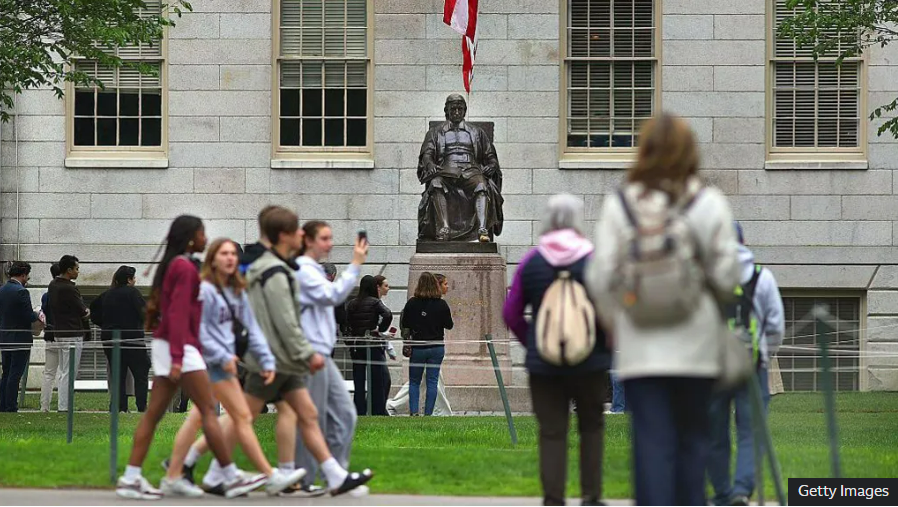International Students face uncertainty amid Trump Administration’s Harvard enrollment restriction – Nsemkeka
The Trump administration, through the Department of Homeland Security (DHS), has issued a directive restricting Harvard University’s ability to enroll international students. According to the DHS, “Harvard can no longer enroll foreign students, and existing foreign students must transfer or lose their legal status.”
However, a significant development has since occurred: a federal judge has granted Harvard University’s emergency motion to block the Trump administration from revoking its ability to enroll international students, as litigation on the matter continues.
In her order, U.S. District Judge Allison Burroughs noted that Harvard had shown “it will sustain immediate and irreparable injury” if the Trump administration is allowed to implement the revocation notice before “there is an opportunity to hear from all parties.”
The ruling temporarily halts the restriction imposed by the DHS, even as the legal battle between the Trump administration and Harvard University continues.
This directive—framed by the administration as a matter of national security and regulatory oversight—has sparked a firestorm of controversy, particularly within the global academic community. The impact is especially pronounced among students from Africa, many of whom had planned to attend Harvard.
For African students, the development is deeply significant. Ivy League institutions like Harvard have historically served as vital gateways for advanced education and professional development, offering opportunities often unavailable in their home countries. The sudden threat of losing these prospects has instilled real fear and uncertainty among both current and prospective African students.
A Ghanaian student currently enrolled at Harvard, who spoke anonymously, remarked, “This directive feels like a direct attack on our future. It’s not just about education; it’s about the hope of returning home and making a difference.”
Impact on International Academic Exchange
Legal experts have expressed skepticism about the DHS’s authority to impose such sweeping restrictions. Analysts are raising concerns about due process and questioning the statutory basis for the directive under the Immigration and Nationality Act (INA). While some in the legal community argue the DHS is within its executive powers, others contend the move constitutes government overreach.
Harvard University officials have voiced concerns that some of the administration’s demands—including an “audit” of student and faculty views—may exceed the federal government’s legitimate authority and potentially infringe on the university’s constitutional rights. These concerns are outlined in data released by the university. Of particular worry is the possibility that such restrictions could undermine long-standing academic exchange programmes, which are often critical in developing and maintaining research capacity in African countries.
Potential Deterrent to African Scholars
The timing of this mandate—unfolding in an intensely politicised climate—has led to speculation about underlying political motives. Homeland Security Secretary Kristi Noem, in a post on X (formerly Twitter), stated that international student enrollment is a privilege, not a right. She added that Harvard could restore its privileges by submitting five years’ worth of records on the conduct of international students within 72 hours. The DHS is especially interested in records—including audio and video—of foreign students’ protest activities deemed “illegal,” “dangerous or violent,” or threatening.
This unprecedented demand for detailed, invasive documentation, and the emphasis on student protests, has been interpreted by many as an attempt to stifle academic freedom and dissent. It follows recent criticism Harvard faced over its handling of pro-Palestinian demonstrations. For many African students—who already face barriers to accessing quality education—such political considerations could become a major deterrent, potentially redirecting talented individuals to more welcoming countries.
While national security is a valid concern, critics argue that the administration’s approach lacks nuance and fails to consider how these actions could disproportionately affect international students.
Impact on African Research and Development
Harvard has a substantial international student population. Data from the university indicates that in the 2024–2025 academic year, 6,793 international students made up 27.2% of the overall student body. In total, 9,970 members of Harvard’s academic community are international.
Restricting enrollment could have broad economic and academic implications, potentially weakening international research partnerships and jeopardising the U.S.’s global leadership in higher education. For African countries, where international collaboration is essential to research and development, the effects could be especially severe. Future interdisciplinary projects, knowledge transfer, and long-term partnerships may all be significantly curtailed.
Loss of Opportunity and Brain Drain
For students from Africa, this development underscores the challenges of pursuing international education. Harvard has historically welcomed students from countries such as Ghana, Nigeria, and South Africa. These students often aim to return home with the skills and knowledge needed to drive national development.
The directive may discourage African students from applying to U.S. institutions—a tragic loss for global intellectual exchange. It could accelerate the “brain drain” phenomenon, with Africa potentially losing some of its brightest minds to more accommodating educational systems elsewhere. This outcome would not only affect the students but also hamper the continent’s development goals.
Addressing the Concerns of International Students
Harvard University has not issued a direct statement in response to this specific directive. However, it has previously affirmed the value of its international students. The Harvard International Office has expanded virtual advising services to support affected students, and further communication will be vital to reassure those navigating this time of uncertainty.
The Importance of International Academic Exchange
While the administration’s stated concerns about campus safety must be acknowledged, the sweeping nature of its demands—particularly those related to surveillance—raises serious questions about academic freedom. The ongoing legal and political fallout will offer deeper insights into the consequences of this directive.
For African students, especially Ghanaians, this moment serves as a reminder of the essential role international academic exchange plays. The global community must now engage in a transparent dialogue about how to balance national security with the imperative of creating a safe, open, and collaborative educational environment.
This can only be achieved through sustained international cooperation and a shared commitment to academic freedom and opportunity for all.

